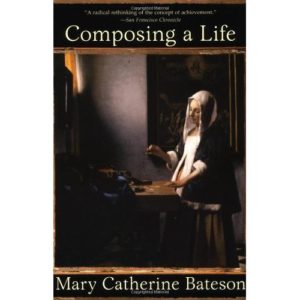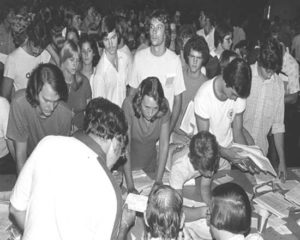When I first came to JMU, I entered a new phase of life: new job as a dual professor-administrator, mother to a new baby (my second), and a new decade (I turned forty soon after I arrived). A few months in, a colleague gave me a copy of Mary Catherine Bateson’s Composing a Life. I think she knew how much I would appreciate Bateson’s topic:
“This book is about life as an improvisatory art, about the ways we combine familiar and unfamiliar components in response to new situations, following an underlying grammar and an evolving aesthetic.”
In the decade since, I have changed administrative roles twice, completed a variety of big-multi-year projects, and turned fifty. I picked Bateson’s book up again this spring. It was high time to revisit it, to take my time with it, and mine it for wisdom.

The cover employs Vermeer’s Woman Holding a Balance (ca1662-5) to suggest one of the book’s central themes: how women seek to balance their myriad conflicting roles.
Here is a traditional review; there are many others. Suffice it to say she examines the lives of five remarkable women that illustrate improvisation and its lessons. They are: Joan Erikson, (dancer and jewelry designer), Johnetta Cole (anthropologist and president of Spelman College), Alice d’Entremont (electrical engineer and corporate leader), Ellen Bassuk (psychiatrist and researcher and advocate on homelessness), and Bateson herself (professor and college administrator). The prose is elegant, the stories moving and relevant–especially if you are a woman in higher ed.
The funny thing is that, as I reread it, I realized how much Bateson’s findings and advice resemble what I tell students. Society puts so much pressure on undergraduates. They are expected to choose a major quickly but wisely, as if it will define them forever. (And what do YOU do, dear?) But we also say “find your passion,” understanding that a job might not be a person’s calling.
Every campus is a place of traditions and continuities yet each is also a place of new beginnings, transitions, and transformations. When I came to JMU, I reinvented myself in important ways—as an employee at a public institution instead of a private college, as a scholar of race and memory instead of class and ethnicity, as mother to a daughter as well as a son, as mentor to faculty much my junior. (Boy, was it a surprise to realize I was no longer “junior.”) Bateson reminds us that life doesn’t follow a clear trajectory, not for most people, not anymore. Nevertheless, American culture (the white, middle-class, urban part anyway) imagines life as a quest. We urge young people to set their goals in childhood. We have them play dress ups as doctors or nurses, princesses and princes, but it isn’t just a game. By middle school they must choose a sport (gymnastics, soccer, basketball, whatever), a particular academic strength (science or math, Lego robotics, preferably something STEMmy), and something creative (violin or piano, art or drama) for well-roundedness. In high school they get pushed into pre-collegiate classes early in hopes that one of them will determine the major to come. And in college they are under similar pressure to get the most of their “college experience,” to join clubs, find internships, and forge new relationships, all while graduating “on time” and with honors.
Bateson gently undermines the whole project. Americans, she observes, view achievement as purposeful, “monolithic,” a relentlessly single-minded pursuit. Popular biographies of exceptionally ambitious people, that is, the successful ones, reinforce the myth. Our cultural aesthetic privileges the struggle to win, to overcome any obstacle, and denigrates those who meander, change course, falter, or lose their way. (p4) I nodded along as I read her words. Most people are not single-minded, not in my experience, not in the past nor in the present. When Bateson’s book came out in 1989, I had just started grad school. Like many of my classmates, I wanted a Ph.D., but I didn’t know if I wanted to teach. And I surely didn’t know if I would find a job. The year I graduated, 1996, turned out to be particular bad, in fact. Every US History position for which I applied had hundreds of applicants! I landed a one-year, visiting position and was damn glad of it. Fortunately, I had worked in the park service before; I had a Plan B and a Plan C, if things didn’t turn out well. And though I soon landed a tenure-track position, I eventually wandered off in a different direction. I am still exploring, in fact.
Improvisation is the metaphor Bateson uses, and I like it. She draws on the musical concept of composition, as well, yet she broadens the term to encompass other arts, such as sculpture, painting, writing, quilting, cooking, dancing, and building. In all these endeavors, the maker chooses from among the various materials and techniques available to her and combines them in a way that makes a unique, coherent, and meaningful whole. The materials and techniques that men and women use to compose lives today deviate sharply from those used by our parents and grandparents. We can’t follow previous generations’ examples. We must make our own music, over and over again.

How the college experience has changed: Remember standing in lines and filling out forms to register? Now students do everything online . Photo courtesy JMU Special Collections.
So, too, college students can’t sing a tune written by others. Much has changed since Bateson’s book appeared in 1989. When I speak to students I cite a startling contemporary statistic: by the age of forty, the average American with a bachelor’s degree will have between ten and fourteen different jobs. Following Bateson, I should perhaps add contemporary statistics on divorce and debt and geographic mobility. “Fluidity and discontinuity are central to reality,” (p13) now more now than ever before. Like Bateson, I celebrate “the creative potential of interrupted and conflicted lives,” and I want young people to have a better sense of what actually awaits them. It’s ok to be undeclared I say. It’s ok to change your major or pick up a second one (or a minor) that speaks to your soul. It’s ok to take electives, and it’s definitely ok to acquire a liberal education along with whatever vocational training one gets. As Bateson concludes, “The compositions we create in these times of change are filled with interlocking messages of our commitments and decisions. Each one is a message of possibility.”